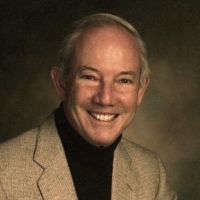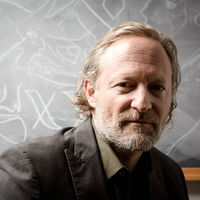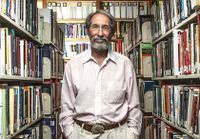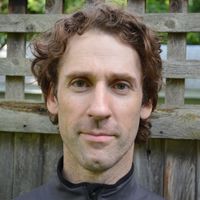Complexity of Commerce Discussants: Difference between revisions
From Santa Fe Institute Events Wiki
(Created page with "{|bord''Italic text''er="0" style="margin: 0px 0px 0px 10px; background: #f9f9f9; border: solid #aaa 1px;" | *Home *Complexity_of_Commerce_Agenda|...") |
No edit summary |
||
| Line 19: | Line 19: | ||
---- | ---- | ||
''Please check back | ''Please check back as discussants will be added as they are confirmed.'' | ||
==<span style="color:#d15a2a"> Discussants Include:</span>== | |||
[[File: Brian-Arthur.jpg|thumb|200px|[https://www.santafe.edu/people/profile/w-brian-arthur '''Brian Arthur''']<br/>'''PARC and Santa Fe Institute''']] | |||
'''Brian Arthur''' is External Professor at the Santa Fe Institute, and Visiting Researcher in the Systems Sciences Lab at PARC (formerly Xerox Parc) in Palo Alto. Arthur pioneered the modern study of positive feedbacks or increasing returns in the economy--in particular their role in magnifying small, random events in the economy and locking in dominant players. This work has gone on to become the basis of our understanding of the high-tech economy. In 2009 he published the book "The Nature of Technology: What it Is and How it Evolves", an elegant and powerful theory of technology's origins and evolution.<br/><br/>Arthur is also one of the pioneers of the science of complexity. His association with the Santa Fe Institute goes back to 1987. He is a member of SFI's Founders Society, and in 1988 directed its first research program—work that has subsequently become the basis for Complexity Economics. He has served many years on SFI's Science Board and Board of Trustees. From 1983 to 1996 Arthur was Morrison Professor of Economics and Population Studies at Stanford University, at the time of appointment the youngest endowed professor at Stanford.<br/><br/>Brian Arthur is the recipient of the Schumpeter Prize in economics, the Lagrange Prize in complexity science, and two honorary doctorates. He earned his Ph.D. from Berkeley in Operations Research and has other degrees in economics, electrical engineering, and mathematics. | |||
<div style="clear: both;"></div> | |||
<hr/> | |||
[[File: davidkrakauer2.jpg|thumb|200px|[https://www.santafe.edu/people/profile/david-krakauer '''David Krakauer''']<br/>'''Santa Fe Institute''']] | |||
'''David Krakauer''' is the President and William H. Miller Professor of Complex Systems at Santa Fe Institute. His research explores the evolution of intelligence on earth. This includes studying the evolution of genetic, neural, linguistic, social and cultural mechanisms supporting memory and information processing, and exploring their shared properties. He served as the founding Director of the Wisconsin Institute for Discovery, the Co-Director of the Center for Complexity and Collective Computation, and Professor of mathematical genetics all at the University of Wisconsin, Madison. David has been a visiting fellow at the Genomics Frontiers Institute at the University of Pennsylvania, a Sage Fellow at the Sage Center for the Study of the Mind at the University of Santa Barbara, a long-term Fellow of the Institute for Advanced Study in Princeton, and visiting Professor of Evolution at Princeton University. In 2012 Dr. Krakauer was included in the ''Wired'' Magazine Smart List as one of 50 people "who will change the World.” In 2016 Krakauer was included in ''Entrepreneur'' Magazine’s visionary Leaders advancing global research and business. | |||
<div style="clear: both;"></div> | |||
<hr/> | |||
[[File: GeoffreyWest.jpg|thumb|200px|[https://www.santafe.edu/people/profile/geoffrey-west '''Geoffrey West''']<br/>'''Santa Fe Institute''']] | |||
'''Geoffrey West''' is the Shannan Distinguished Professor and former President of the Santa Fe Institute and Associate Senior Fellow of Oxford University’s Green-Templeton College. His BA is from Cambridge and his PhD from Stanford, where he later returned to join the faculty. West is a theoretical physicist whose primary interests have been in fundamental questions ranging from the elementary particles and their cosmological implications to universal scaling laws in biology and a quantitative science of cities, companies and global sustainability. His work is motivated by the search for “simplicity underlying complexity.” His research includes metabolism, growth, aging and lifespan, sleep, cancer and ecosystems, the dynamics of cities and companies, rates of growth and innovation, and the accelerating pace of life.<br/><br/>West has given many lectures world-wide including Davos and TED. Among his awards are the Mercer Prize from the Ecological Society of America, the Weldon Prize for Mathematical Biology, the Glenn Award for Aging Research and the Szilard Award from the American Physical Society. He has been featured in many publications world-wide including the ''New York Times'', ''Financial Times'', ''Wired'', ''Time'', ''The Economist'', ''Nature'' and ''Science'' and participated in television productions including ''Nova'', ''National Geographic'' and ''BBC''. He is the author of the best-selling book ''Scale''. His public service includes serving on the Council of the World Economic Forum. His work was selected as a breakthrough idea by the ''Harvard Business Review'' in 2006 and he was on ''Time'' magazine’s list of “100 Most Influential People in the World” in 2007. | |||
<div style="clear: both;"></div> | |||
<hr/> | |||
[[File: Hal.Varian2.jpg|thumb|200px|[https://www.gv.com/team/hal-varian/ '''Hal Varian''']<br/>'''Google''']] | |||
'''Hal Varian''' is the chief economist at Google. Since 2002 he has been involved in many aspects of the company, including auction design, econometric analysis, finance, corporate strategy and public policy. Hal also holds academic appointments at the University of California, Berkeley in three departments: business, economics, and information management. <br/><br/>Hal is a fellow of the Guggenheim Foundation, the Econometric Society, and the American Academy of Arts and Sciences. He was co-editor of the American Economic Review from 1987-1990 and holds honorary doctorates from the University of Oulu, Finland and the University of Karlsruhe, Germany.<br/><br/>He has published numerous papers in economic theory, industrial organization, financial economics, econometrics and information economics. He is the author of two major economics textbooks which have been translated into 22 languages. He is the co-author of a bestselling book on business strategy, ''Information Rules: A Strategic Guide to the Network Economy'' and wrote a monthly column for the ''New York Times'' from 2000 to 2007. | |||
<div style="clear: both;"></div> | |||
<hr/> | |||
[[File: Peter.Dodds.jpg|thumb|200px|[http://www.uvm.edu/pdodds/ '''Peter Dodds''']<br/>'''University of Vermont''']] | |||
'''Peter Dodds''' is a Professor at the University of Vermont (UVM) working on system-level problems in many fields, ranging from sociology to physics. He is Director of the UVM's Complex Systems Center, co-Director of UVM's Computational Story Lab, and a visiting faculty fellow at the Vermont Advanced Computing Core. He maintains general research and teaching interests in complex systems and networks with a current focus on sociotechnical and psychological phenomena including collective emotional states, contagion, language, and stories. His methods encompass large-scale sociotechnical experiments, large-scale data collection and analysis, and the formulation, analysis, and simulation of theoretical models. Dodds's training is in theoretical physics, mathematics, and electrical engineering with extensive formal postdoctoral and research experience in the social sciences. Dodds has received funding from NSF, NASA, ONR, and the MITRE Corporation, among others, notably being awarded an NSF CAREER by the Social and Economic Sciences Directorate. | |||
<div style="clear: both;"></div> | |||
<hr/> | |||
Revision as of 18:27, 8 July 2019
SFI ACtioN Topical Meeting
September 12, 2019
San Francisco, CA
Please check back as discussants will be added as they are confirmed.
Discussants Include:

PARC and Santa Fe Institute
Brian Arthur is External Professor at the Santa Fe Institute, and Visiting Researcher in the Systems Sciences Lab at PARC (formerly Xerox Parc) in Palo Alto. Arthur pioneered the modern study of positive feedbacks or increasing returns in the economy--in particular their role in magnifying small, random events in the economy and locking in dominant players. This work has gone on to become the basis of our understanding of the high-tech economy. In 2009 he published the book "The Nature of Technology: What it Is and How it Evolves", an elegant and powerful theory of technology's origins and evolution.
Arthur is also one of the pioneers of the science of complexity. His association with the Santa Fe Institute goes back to 1987. He is a member of SFI's Founders Society, and in 1988 directed its first research program—work that has subsequently become the basis for Complexity Economics. He has served many years on SFI's Science Board and Board of Trustees. From 1983 to 1996 Arthur was Morrison Professor of Economics and Population Studies at Stanford University, at the time of appointment the youngest endowed professor at Stanford.
Brian Arthur is the recipient of the Schumpeter Prize in economics, the Lagrange Prize in complexity science, and two honorary doctorates. He earned his Ph.D. from Berkeley in Operations Research and has other degrees in economics, electrical engineering, and mathematics.

Santa Fe Institute
David Krakauer is the President and William H. Miller Professor of Complex Systems at Santa Fe Institute. His research explores the evolution of intelligence on earth. This includes studying the evolution of genetic, neural, linguistic, social and cultural mechanisms supporting memory and information processing, and exploring their shared properties. He served as the founding Director of the Wisconsin Institute for Discovery, the Co-Director of the Center for Complexity and Collective Computation, and Professor of mathematical genetics all at the University of Wisconsin, Madison. David has been a visiting fellow at the Genomics Frontiers Institute at the University of Pennsylvania, a Sage Fellow at the Sage Center for the Study of the Mind at the University of Santa Barbara, a long-term Fellow of the Institute for Advanced Study in Princeton, and visiting Professor of Evolution at Princeton University. In 2012 Dr. Krakauer was included in the Wired Magazine Smart List as one of 50 people "who will change the World.” In 2016 Krakauer was included in Entrepreneur Magazine’s visionary Leaders advancing global research and business.

Santa Fe Institute
Geoffrey West is the Shannan Distinguished Professor and former President of the Santa Fe Institute and Associate Senior Fellow of Oxford University’s Green-Templeton College. His BA is from Cambridge and his PhD from Stanford, where he later returned to join the faculty. West is a theoretical physicist whose primary interests have been in fundamental questions ranging from the elementary particles and their cosmological implications to universal scaling laws in biology and a quantitative science of cities, companies and global sustainability. His work is motivated by the search for “simplicity underlying complexity.” His research includes metabolism, growth, aging and lifespan, sleep, cancer and ecosystems, the dynamics of cities and companies, rates of growth and innovation, and the accelerating pace of life.
West has given many lectures world-wide including Davos and TED. Among his awards are the Mercer Prize from the Ecological Society of America, the Weldon Prize for Mathematical Biology, the Glenn Award for Aging Research and the Szilard Award from the American Physical Society. He has been featured in many publications world-wide including the New York Times, Financial Times, Wired, Time, The Economist, Nature and Science and participated in television productions including Nova, National Geographic and BBC. He is the author of the best-selling book Scale. His public service includes serving on the Council of the World Economic Forum. His work was selected as a breakthrough idea by the Harvard Business Review in 2006 and he was on Time magazine’s list of “100 Most Influential People in the World” in 2007.

Hal Varian is the chief economist at Google. Since 2002 he has been involved in many aspects of the company, including auction design, econometric analysis, finance, corporate strategy and public policy. Hal also holds academic appointments at the University of California, Berkeley in three departments: business, economics, and information management.
Hal is a fellow of the Guggenheim Foundation, the Econometric Society, and the American Academy of Arts and Sciences. He was co-editor of the American Economic Review from 1987-1990 and holds honorary doctorates from the University of Oulu, Finland and the University of Karlsruhe, Germany.
He has published numerous papers in economic theory, industrial organization, financial economics, econometrics and information economics. He is the author of two major economics textbooks which have been translated into 22 languages. He is the co-author of a bestselling book on business strategy, Information Rules: A Strategic Guide to the Network Economy and wrote a monthly column for the New York Times from 2000 to 2007.

University of Vermont
Peter Dodds is a Professor at the University of Vermont (UVM) working on system-level problems in many fields, ranging from sociology to physics. He is Director of the UVM's Complex Systems Center, co-Director of UVM's Computational Story Lab, and a visiting faculty fellow at the Vermont Advanced Computing Core. He maintains general research and teaching interests in complex systems and networks with a current focus on sociotechnical and psychological phenomena including collective emotional states, contagion, language, and stories. His methods encompass large-scale sociotechnical experiments, large-scale data collection and analysis, and the formulation, analysis, and simulation of theoretical models. Dodds's training is in theoretical physics, mathematics, and electrical engineering with extensive formal postdoctoral and research experience in the social sciences. Dodds has received funding from NSF, NASA, ONR, and the MITRE Corporation, among others, notably being awarded an NSF CAREER by the Social and Economic Sciences Directorate.

